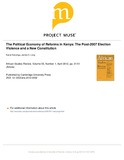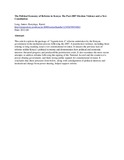| dc.contributor.author | Long, James | |
| dc.contributor.author | Kanyinga, Karuti | |
| dc.date.accessioned | 2013-08-06T12:01:40Z | |
| dc.date.available | 2013-08-06T12:01:40Z | |
| dc.date.issued | 2012-04 | |
| dc.identifier.citation | African Studies Review, Volume 55, Number 1, April 2012, pp. 31-51 (Article) Published by Cambridge University Press DOI: 10.1353/arw.2012.0002 | en |
| dc.identifier.uri | http://erepository.uonbi.ac.ke:8080/xmlui/handle/123456789/54863 | |
| dc.description.abstract | This article explores the package of “Agenda item 4” reforms
undertaken by the Kenyan government in the mediation process following
the 2007–8 postelection violence, including those relating to long-standing
issues over constitutional revision. It situates the previous lack of reforms
within Kenya’s political economy and demonstrates how political and economic
interests thwarted progress and produced the postelection crisis.
It also examines the more recent attempts to address reforms following
the signing of the National Accord and the creation of a power-sharing
government, and finds strong public support for constitutional revision.
It concludes that these pressures from below, along with a realignment of political interests and institutional change from power-sharing, helped support
reform. | en |
| dc.language.iso | en | en |
| dc.publisher | University of Nairobi | en |
| dc.title | The Political Economy of Reforms in Kenya: The Post-2007 Election Violence and a New Constitution | en |
| dc.type | Article | en |
| local.publisher | Institute for Development Studies,University of Nairobi | en |


